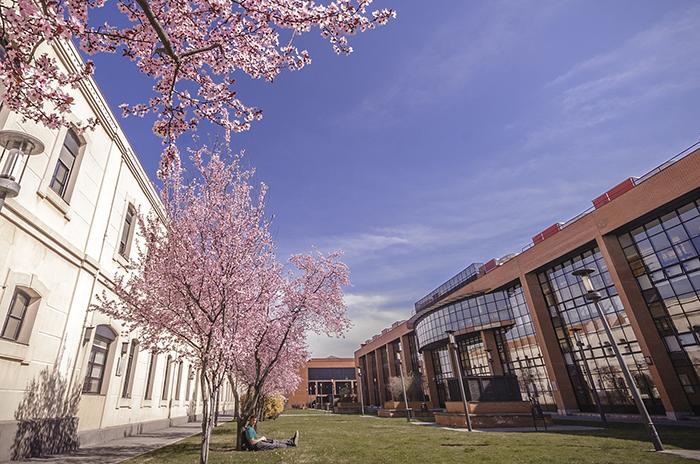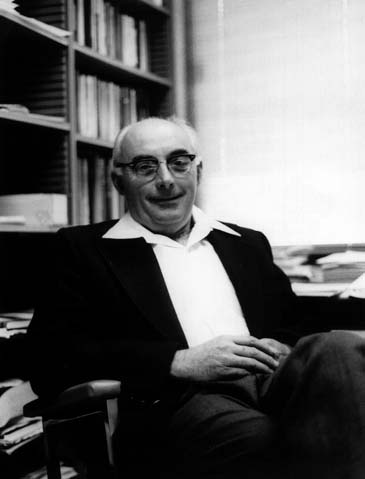Topics in Le Cam's Asymptotic Theory of Statistical Experiments
A monographic workshop devoted to Le Cam's asymptotic theory. Some of the topics covered are: local asymptotic normality and contiguity, convergence of statistical experiments, locally asymptotically optimal testing, and locally asymptotically optimal estimation.

Overview
Marc Hallin, emeritus professor at Université libre de Bruxelles and Excellence Chair 2017 at the Carlos III University of Madrid (UC3M), will give on the 22-24th of May 2017 a monographic workshop in Le Cam’s asymptotic theory of statistical experiments. The workshop is organized by the Department of Statistics of UC3M.

The Department of Statistics at UC3M (Getafe)
About Le Cam’s work

Lucien Le Cam (1924-2000) was one of the greatest mathematical statisticians of the twentieth century. Le Cam obtained his PhD from the University of Berkeley, where he spent almost all his academic career. A compact description of Le Cam’s work, extracted from his obituary in the IMS bulletin, is:
Le Cam was a principal architect of the modern asymptotic theory of statistics. His life-work was a coherent theory of statistics in which asymptotic “approximations” played a strong role. […] Le Cam’s most widely-recognized contributions were the Local Asymptotic normality condition (LAN) in 1960, the contiguity concept and its consequences, and simple one-step constructions of asymptotically optimal estimates. Around 1970, Jaroslav Hájek and Nobuo Inagaki independently formulated the convolution theorem for parametric estimation. Using Le Cam’s LAN concept, Hájek proved the convolution theorem and, in another paper, the local asymptotic minimax theorem under elegantly minimal assumptions. These theorems, as well as Hájek’s earlier use of contiguity in studying rank tests, revealed to others the remarkable potential in Le Cam’s ideas and popularized them. […] Le Cam’s monumental work on asymptotics culminated in his “big” book, Asymptotic Methods in Statistical Decision Theory, which was published in 1986. Through formal comparison of statistical experiments by means of the Le Cam distance and deficiency, the book quantifies the extent to which two statistical problems are similar and the extent to which a procedure approximately efficient in one problem can be mapped into a procedure approximately efficient in the other.
About Marc Hallin

Marc Hallin holds a PhD in Sciences & Mathematics from the Université libre de Bruxelles (1976). His main research interests are in mathematical statistics (asymptotics, time series, and rank-based inference) and econometrics (high-dimensional time series and factor models). He is the author or coauthor of about 200 publications in mathematical statistics and econometrics. He has been Editor-in-Chief of the International Statistical Review, and is Editor-in-Chief of Statistical Inference for Stochastic Processes. He is also on the editorial boards of the Journal of the American Statistical Association, the Journal of Econometrics, the Annals of Computational and Financial Econometrics, the Journal of the Japan Statistical Society, and the Annales de l’Institut de Statistique de l’Université de Paris. A Fellow of the Institute of Mathematical Statistics (IMS), the American Statistical Association (ASA), and the International Statistical Institute (ISI), he is member of the Classe des Sciences of the Royal Academy of Belgium.
Workshop program
The 12 hours workshop will take place in the 22nd, 23rd and 24th of May 2017 and consists of 4 hours per day, allocated between 9:00 and 14:00. The language of the workshop will be English.
The topics covered include: local asymptotic normality and contiguity, convergence of statistical experiments, locally asymptotically optimal testing, and locally asymptotically optimal estimation. The course will be carried out in an old school way: blackboard, chalk and math.
Lessons are to be held in clasroom 10.1.06 of the Getafe campus of UC3M. The classroom is located at the first floor of building 10 (Campomanes). The exact coordinates are given in the map below.
Registration and certificate
The registration is free of charge, but is mandatory to sign up in advance. To register, fill in this form. Participants attending to all the sessions will receive a certificate.
The registration deadline is the 10th of May 2017.
How to get to Getafe
The easiest way to get to Getafe from Madrid is Cercanías line C-4, either departing from Sol, Atocha, Nuevos Ministerios or Chamartín. The closest stops to the UC3M campus are Las Margaritas or Getafe Centro, both at a 14 minutes walking distance. The direction towards Madrid is either Alcobendas-San Sebastián de los Reyes or Colmenar Viejo; the direction towards Getafe is Parla. This is a schematic representation of the line:
| Parla | Getafe | Madrid | Alcobendas-S.S. de los Reyes / Colmenar V. |
Recall that line C-3 also goes through Getafe but the train stop (Getafe industrial) is far away from the campus.
Organization
- Scientific comittee: Eduardo García Portugués, Esther Ruíz Ortega and Thomas Verdebout.
- Organizing comittee: Eduardo García Portugués, Esther Ruíz Ortega (chair) and Susana Linares (secretary).
Funding
The workshop is funded and supported by:
- School of Law and Social Sciences, Carlos III University of Madrid
- Department of Statistics, Carlos III University of Madrid
- Carlos III University of Madrid
Contact
In case of questions, you may contact slinares@pa.uc3m.es or edgarcia@est-econ.uc3m.es.